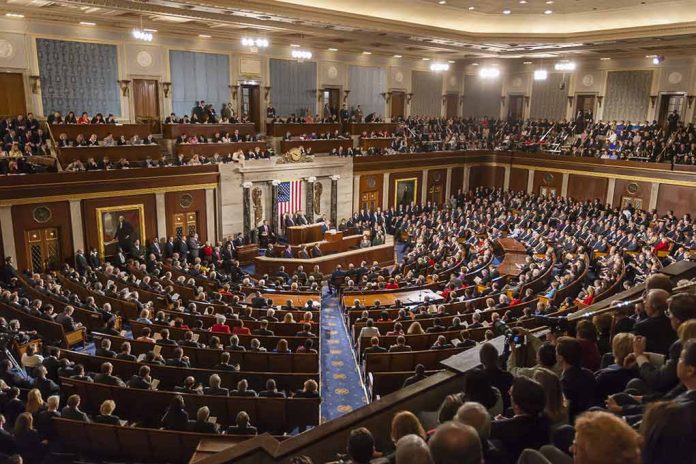
House Republicans have voted to overturn Biden-era regulations limiting bank overdraft fees to $5, a measure that will now head to the President’s desk after passing with a 217-211 vote.
Key Takeaways
- The House voted to overturn a Biden Administration rule that would cap bank overdraft fees at $5, following similar action by the Senate.
- Republicans argue the regulation would limit consumer access to credit and force banks to stop offering overdraft protection services.
- Large banks currently earn approximately $8 billion annually from overdraft fees, which can reach as high as $35 per transaction.
- The rule would have applied to financial institutions with over $10 billion in assets and was part of Biden’s broader effort to eliminate “junk fees.”
- The resolution now heads to President Trump for signature, using the Congressional Review Act to reverse the regulation.
Congressional Action Against Overdraft Fee Limits
The House of Representatives has voted to overturn a Biden administration regulation that would limit bank overdraft fees, joining the Senate in rejecting the rule. The measure passed with a 217-211 vote and will now advance to President Trump’s desk for his signature. The regulation, which would have capped overdraft fees at $5, was part of President Biden’s broader initiative to reduce what his administration termed “junk fees” imposed on consumers, an effort estimated to save Americans $5 billion annually.
House votes to overturn Biden-era rule limiting bank overdraft fees to $5, sends to Trump to sign https://t.co/BevPEfyWRH pic.twitter.com/WX4RIEUhvk
— darlene superville (@dsupervilleap) April 10, 2025
Currently, the nation’s largest banks collect approximately $8 billion each year from overdraft fees, with no federal limit on how much they can charge. These fees, which can run as high as $35 per transaction, disproportionately affect customers who maintain low account balances and live paycheck to paycheck. The rule would have required banks and credit unions with assets exceeding $10 billion to choose from three fee options, including a flat $5 fee.
Republican Opposition to Fee Regulations
Republicans in Congress have strongly opposed the overdraft fee regulation, arguing it would harm consumers by restricting access to credit and financial services. They utilized the Congressional Review Act, which allows Congress to overturn federal regulations, to advance their opposition to what they view as government overreach in banking regulations. The banking industry has maintained that overdraft protection provides a valuable service that helps consumers avoid bounced checks and declined transactions.
Arkansas Representative French Hill, like many of his Republican colleagues, has expressed concern that the regulation would force financial institutions to discontinue overdraft protection entirely, potentially driving consumers toward less regulated and higher-risk lenders. Banking industry representatives have echoed this sentiment, warning that without access to overdraft services, Americans facing emergency expenses might turn to payday lenders or other alternative financial services with potentially higher costs.
Democratic Defense of Consumer Protections
Democrats have defended the overdraft fee rule as a necessary consumer protection measure aimed at preventing banks from exploiting vulnerable customers. They argue that the existing overdraft fee structure has evolved far beyond its original purpose of preventing checks from bouncing. Instead, they contend, it has become a significant revenue source for banks at the expense of financially struggling Americans. During floor debates, Democratic representatives characterized the Republican effort as favoring bank profits over consumer welfare.
Consumer advocates have expressed disappointment with the congressional action, noting that overdraft fees often trigger a cascade of financial problems for consumers already struggling with their finances. They point out that a single overdraft can lead to multiple fees if a customer makes several transactions while unaware their account is overdrawn. The Biden administration had framed the rule as closing a loophole from the paper-check era that has allowed financial institutions to profit excessively from customers who may not understand the full implications of overdraft services.
Implications for Banking Industry and Consumers
With the House and Senate both voting to overturn the rule, the future of overdraft fee regulation now depends on presidential action. The banking industry has welcomed congressional intervention, with industry groups arguing that government price controls would reduce financial product availability and potentially harm the very consumers the regulation aimed to protect. They emphasize that many banks have already voluntarily reduced or eliminated overdraft fees in response to market competition.
For consumers, particularly those living paycheck to paycheck, the congressional action means that high overdraft fees may continue at financial institutions that choose to maintain them. Consumer advocates warn this could perpetuate a cycle where those least able to afford these fees bear the greatest burden. The debate highlights the ongoing tension between industry calls for regulatory flexibility and consumer protection advocates’ push for stronger government intervention in financial services.
Sources:
House votes to overturn Biden-era rule limiting bank overdraft fees to $5, sends to Trump to sign
House votes to overturn Biden-era rule limiting bank overdraft fees to $5, sends to Trump to sign
House Votes to Overturn Biden-era Rule Limiting Bank Overdraft Fees







